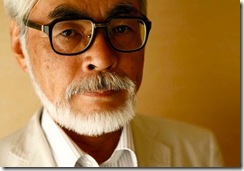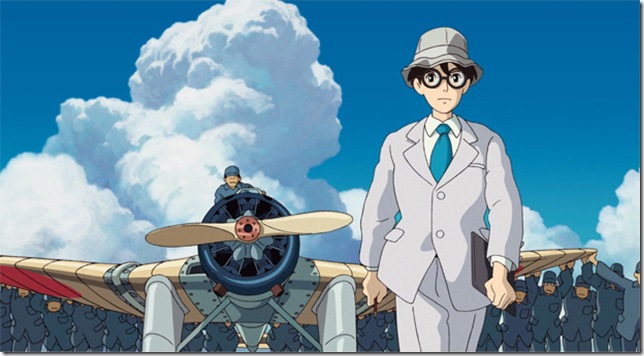The Wind Rises, the self-professed final film from Japanese animation master Hayao Miyazaki (Spirited Away), is as visually masterful as ever. It’s filmed in his preferred, largely hand-drawn and 2D style, with deep attention paid to the flickers of light and the accuracy of shadows, to the right amount of ash and flames swirling above an earthquake-stricken city and to the correct quotient of tears and sweat trickling down its characters’ visages.
Yes, it’s a cartoon, but I can say with awestruck certainty that I forgot I was watching an animated picture — so authentic were its human emotions, so believable was its protagonist’s internal struggle, so intelligent was its dialogue and the moral calculations within it. If Miyazaki’s retirement is legit, he’s leaving the movie world with a staggering swan song. The Wind Rises is a film that will affect you on every level, from violence that is shockingly harrowing for an animated film to an elemental love story so moving it’s hard to imagine real-life actors capturing its textures so beautifully.
Miyazaki’s final film has a lengthy provenance. It’s based on his own manga, which was in turn adapted from a short story by the mid-20th century writer Tatsuo Hori, which itself was a fictionalized biography of Jiro Horikoshi, an aeronautics engineer who designed the world’s first monoplane shipboard fighter for use in the Second World War.
The Jiro of The Wind Rises is a dreamer, lost from a young age in the world of gull wings and cockpits and retractable undercarriages. His inspiration is Giovanni Battista Caproni, the real-life Italian aircraft engineer, who turns up in Jiro’s high-flying dreams (and, apparently, vice versa). But rather than live in the fantasies of a Walter Mitty, Jiro realizes his dreams, toiling his way to the top of Japan’s fledgling aeronautics division at a time that is both bustling and inopportune: the work in question is the design of fighter pilots that can rival the sky behemoths being produced in Germany and the United States.
 Jiro is realizing his dream, but the implications are nightmarish; for Jiro to do his job and revolutionize air travel, he must be complicit in mass slaughter. The Wind Rises is both a celebration of a frontier of technological progress and an exploration of its darkest utility. It’s no surprise this courageous movie has been labeled controversial in its native Japan, with Miyazaki facing criticism from both sides: He’s been harangued from the right for the film’s seeming antiwar message, and also faced criticism from the left for honoring the designer of war machines.
Jiro is realizing his dream, but the implications are nightmarish; for Jiro to do his job and revolutionize air travel, he must be complicit in mass slaughter. The Wind Rises is both a celebration of a frontier of technological progress and an exploration of its darkest utility. It’s no surprise this courageous movie has been labeled controversial in its native Japan, with Miyazaki facing criticism from both sides: He’s been harangued from the right for the film’s seeming antiwar message, and also faced criticism from the left for honoring the designer of war machines.
It’s true that sometimes, when both sides hate you, it means you’re doing a good job. And The Wind Rises is an emotionally transcendent epic that in fact does address a sensitive topic but refuses to judge its protagonist, who is neither a saint nor sinner. Moreover, its themes explore issues well beyond this central thesis, addressing imperialism, totalitarian rule, disease, economic recession and homelessness. After all, it is the Japanese government, not Jiro, who is funding its military-industrial complex at the expense of its people, who huddle outside restaurants for scraps and clog the roadways in search of menial labor. Jiro is a session player in one of world history’s most tragic ballads.
We get a vivid sense of all of this in The Wind Rises, not to mention a remarkably mature love story between Jiro and his fiancée Naoko, who harbors a crushing secret. Jiro’s subsequent conflict between work and family becomes the push-and-pull that finally sends him wobbling into the movie’s climax, which is equally sublime and heartbreaking. Thanks to the black-and-white emotionality of most Hollywood cinema, we’re not used to feeling two things at the same time; for Miyazaki, it took another animated film to bring out all the colors.
THE WIND RISES. Director: Hayao Miyazaki; voice cast: Joseph Gordon-Levitt, Emily Blunt, John Krasinski, Martin Short, Werner Herzog, William H. Macy, Mandy Patinkin; Distributor: Disney; Rating: PG-13; Opens: Friday at most area theaters
